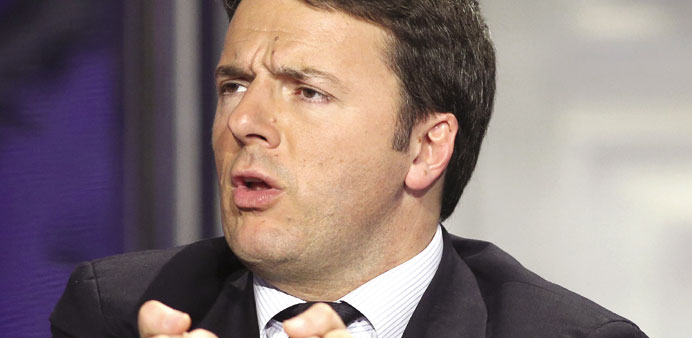Renzi: If all goes well, we will be able to say that we have turned a page of utmost importance for our country.
DPA/Reuters/AFP/Rome
The Italian parliament granted its final approval yesterday to a new election law that is a controversial plank of the wide-ranging political reforms spearheaded by Prime Minister Matteo Renzi.
The so-called Italicum aims to end Italy’s political instability.
It grants a 55% parliamentary majority to the party that obtains at least 40% of the votes or, failing that, wins the most votes in a second-round ballot.
The lower house of parliament, the Chamber of Deputies, approved it in a 334-61 vote, with no abstentions.
Opposition members of the 630-seat assembly walked out before the ballot, in a symbolic act of protest.
A minority faction of the ruling Democratic Party (PD), which was also opposed to the Italicum, stayed in the chamber and voted against.
Critics argue that the reform will grant too many powers to the executive, weakening parliament and constitutional checks and balances.
Renzi has steamrolled those arguments, winning last week three votes of confidence linked to the passage of the bill, which paved the way for yesterday’s final approval.
In a speech at the Milan stock exchange, the premier said the law would bring order to Italy’s messy politics.
“We will have a system that will finally make our country a benchmark for political stability, which is a precondition for economic innovation,” he said.
“The electoral law has become a symbol. For years Italians were used to a political class that promised a lot and did nothing,” Renzi said ahead of the vote. “This time around, we said that we will reach our goals and we are doing so. If all goes well, we will be able to say that we have turned a page of utmost importance for our country.”
That view was endorsed by Marc Lazar, an Italy expert at Paris’s elite Sciences Po graduate school.
“It is an important date for Italy. It may be the umpteenth reform of the electoral law but this one is important, which explains why the debate has been so vigorous,” Lazar told AFP. “It will give the country political stability – a major issue for Italian politics will be finally resolved.”
Lazar said fears of a possible threat to democracy were exaggerated but understandable given Italy’s experience of fascism.
Italy has had 63 governments in 69 years of republican history, and four over the last four years.
A former economy minister, Fabrizio Saccomanni, told DPA in January that “each change of government results in a [governance] paralysis of at least six months”.
According to Francesco Galietti, founder of the Policy Sonar think tank, Italy does need to amend a post-war constitution that was “more concerned with avoiding another Benito Mussolini than creating a workable government”.
“Anyone who is serious about governing Italy – and not just getting elected – will have to overcome Italy’s self-blocking institutional architecture,” Galietti said, noting that the Italicum was part of a bigger constitutional overhaul.
Renzi is also trying to turn the upper chamber of parliament, the Senate, into a non-elected assembly with limited powers, and return to the central government competences previously devolved to regional bodies.
He hopes to complete the package by mid-2016.
Renzi, a former mayor of Florence, has also pledged to transform Italy’s snail-based judicial system and says his biggest reform challenge will be to shake up the education system.
However, with the economy still struggling and unemployment having recently started rising again from record highs, the jury is still out on whether Renzi can deliver on his self-declared goal of fundamentally changing Italy.
“In the end, Italians will judge him on other things than this electoral law,” Lazar said. “Can he turn the economy around and stop Italy’s decline?”

